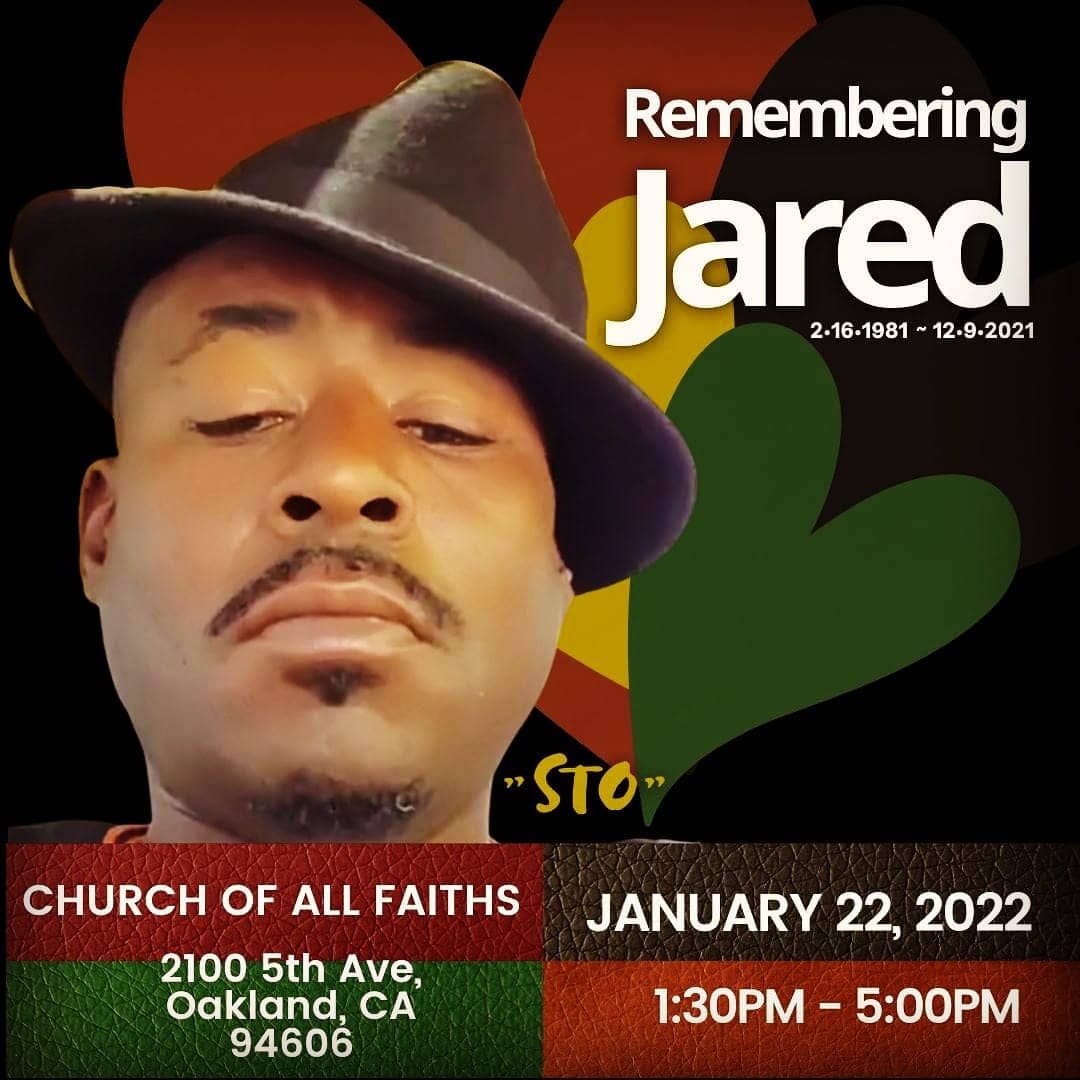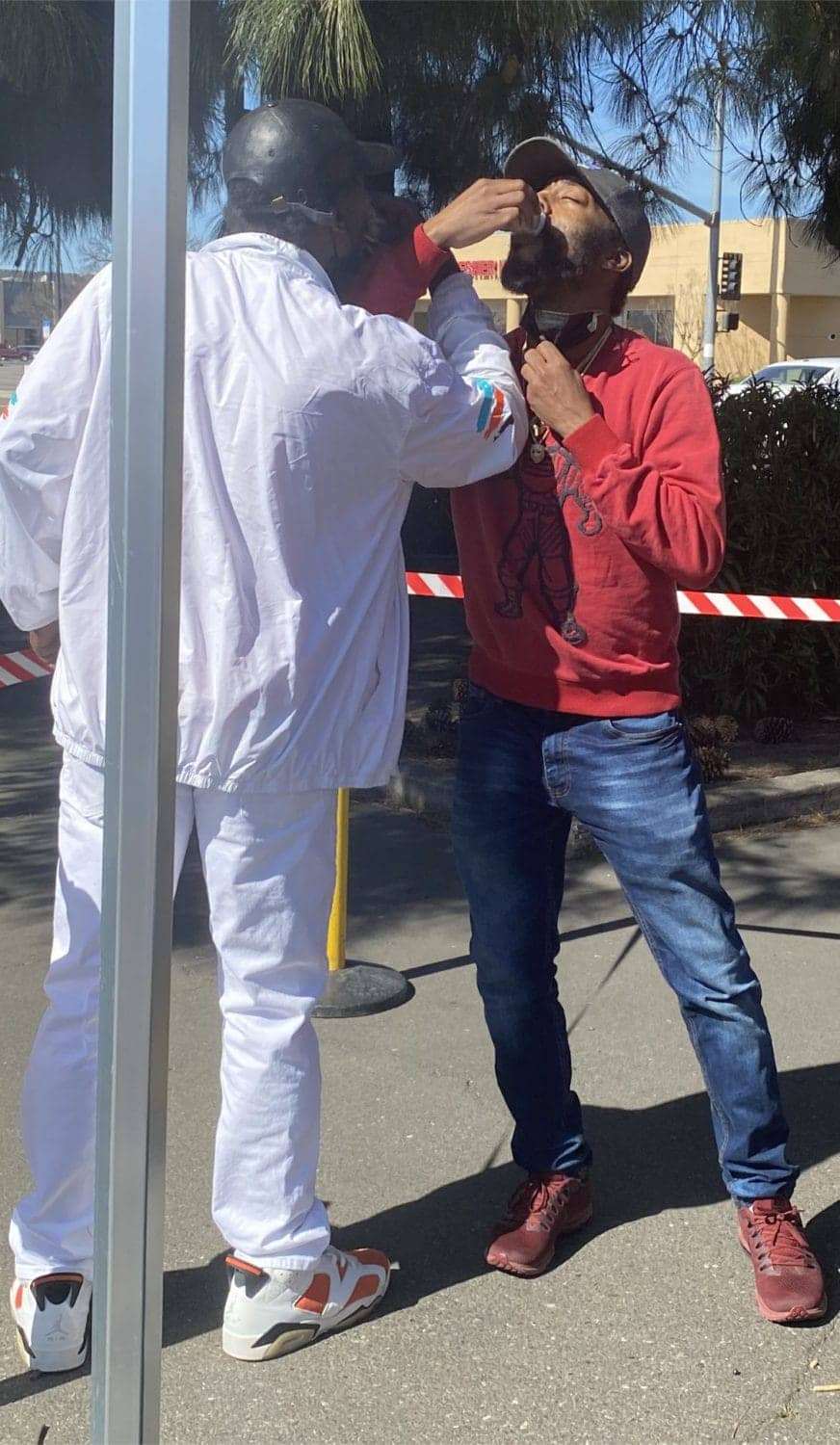
by Minister of Information JR Valrey, SF Bay View Oakland Bureau
2021 took a lot of people who are family to me, like my cousins Jamario and Eric Hooker, my Aunt Doris, my Uncle Dell, my community-sister Mahasen, my potnas, rappers Shock G and Biaje, and I’m sure there’s a few that I forgot to name. Before that horrendous year let out, one of my first roommates I had when I moved out transitioned to the spirit realm. Although we had not spent a lot of time with each other in decades, when producer Jared Meeks died, I felt a part of me die – a part of my young self.
I met Kali and his twin brother Jared in the late ‘90s, and we had a bachelor pad – apartment – on 11th Ave and East 28th, where over a four-year period we had a host of different roommates. Every room in the house was turned into a bedroom except the kitchen and bathroom. Our most famous roommate was the revolutionary Oakland Hip Hop legend Askari X, who Kali and Jay continuously made beats for.
At that time, I was the organizer and journalist, Askari X was the master rapper, Kali and Jared aka Jay were the in-house producers. We were a powerhouse team. Life then took over, and the squad had to break up to deal with our individual lives. One thing is for sure, and two is for certain, the bonds stayed strong when we moved away from each other. I love and salute my brother Jared aka Jay. He will be missed.
I talked to Kali Meeks, Jared’s twin brother, to give our readers insight into the life of a street music legend that the masses did not know much about, but he was instrumental in the careers of some of Oakland’s most well known rappers. Check out Kali in his own words and please contribute to Jared’s memorial fund, if possible.
JR Valrey: How did you and Jay get into music?
Kali Meeks: We beatboxed and free-styled to each other all the time. We used to overdub sounds and vox with a cheap, hissy, dual-cassette karaoke machine. In 1996, we saved up $600 and bought our first legitimate piece of music equipment, the Roland PMA-5. We learned midi production on it. We teamed up with Dj Scientific (RIP) and built a small studio in West Oakland. Jayzer definitely sparked Shady Nate of Livewire Record’s journey as an artist, because he was the first to produce and record him.
JR Valrey: In the late ‘90s and early 2000’s we all lived together along with Askari X, what did that time mean to y’all? Can you talk about the collective of people that was around us at that time?
Kali Meeks: Askari X is an Oakland rap legend. So those years living with Askari was like living with a lyrical Jedi master teacher. We used to build on everything from history to philosophy etc. Those were good times. I remember making a Mother’s Day song with Askari and the joy of him performing with his Mom at the Uhuru House.
Jay’s sound can be described as painting a sonic canvas with mixed mediums like acrylic, oil and watercolor in one art piece.
My favorite times were when I recorded Askari and Tajai of Hiero together in the studio. JR, blud! Do you remember that crazy performance on a flatbed truck with Askari and Zumbi (RIP) with a generator and speakers?! It was normal for factors to pull up to the crib back then, for example dead prez, Delinquents, Warclub Hawk, and even the late former political prisoner and Black Panther legend, Geronimo Ji-Jaga! Peace to all the Ansars, Warclub Hawk and Black-Native community.
JR Valrey: Can you talk a little bit about the story behind how y’all began making music with Robert Moody? Can you talk about the effect that the Black Panthers and Black power movement had on you at that time?
Kali Meeks: Mr. Robert Moody, a Panther, philanthropist and producer, mentored us on how to write grants and requests for proposals. We had a connection with Mr. Moody because he had a passion for making beats too. His production weapon of choice was the Ensoniq. After making the 1st Annual 2pac Conference a reality, I understood more of what the Black movement stood for. The support from all the legendary Panthers around us at that time had a positive effect on us. They helped raise our social awareness and emphasized the virtue of giving back to our community.
JR Valrey: Can you talk about the years y’all spent making music with the Boogie Shack? What made y’all comfortable about joining that music collective?

Kali Meeks: The Boogie Shack was like an artist and DJ collective. They had the event and function scene lit. What can I say, Boogie Shack is like family. Shout out to Big Tiri, Korise, Monte (Phil), Thump, Kito, Nige and all the rest of the gang.
JR Valrey: As a producer, how would you describe Jay’s sound? How was it different from your sound?
Kali Meeks: Jay’s sound can be described as painting a sonic canvas with mixed mediums like acrylic, oil and watercolor in one art piece. He’d rub the top of his head while laying midi tracks. It was like he was rubbing a lamp with a musical genie in there – like foley art in slap form. I’d say our sound differed due to my infatuation with a logical workflow of the tracks. My sound was a tad more rigid or mechanical. Jay had that groove and bounce element.
He would just cook up a slap in any style he imagined. I’d classify it as a new genre, “‘Blockz’ or ‘Sto’ Music.”
JR Valrey: What kinds of drums and sounds did Jay like? What genre of Hip Hop would you classify his beats under?
Kali Meeks: When it came to beats, Jayzer was like that wood character in Tekken that had special move abilities of all the other fighters in the game. Whether Jay wanted to do Boombap, Trap, Drill or Mobshit type beats, it didn’t matter. He would just cook up a slap in any style he imagined. I’d classify it as a new genre, “‘Blockz’ or ‘Sto’ Music.”
JR Valrey: Are there any music projects underway that will utilize some of the unreleased beats Jay made?
Kali Meeks: I am currently figuring out a way to create a preservation project of his musical work and create Non Fungible Tokens with his tracks and store them forever in the blockchain.
JR Valrey: What did Jay want people to get from his music?
Kali Meeks: I think Jared wanted people to experience his worldview and perception about our hoods, blocks, turfs and overall inner city street life through his ability to illustrate it with sound.
JR Valrey: Where did your brother get the name Jayzer from?
Kali Meeks: Me. I called him Jayzer as a nickname, because I didn’t like calling him by his first name in public. You know we knew him as Jay/Jayzer. Boogie Shack remembers him as JihadScorsese. The Town remembers him as Sto’. I’m just remembering my brother as Jared.
JR Valrey: How could people support the memorial fund for Jay?
Kali Meeks: “Remembering Jared” Memorial Fund on Go Fundme: https://gofund.me/ccc89613.
Thank you for your support JR. I really appreciate this interview. God bless.
JR Valrey, journalist, author, filmmaker and founder of Black New World Media, heads the SF Bay View’s Oakland Bureau. He can be reached at blockreportradio@gmail.com or on Facebook. Visit www.BlackNewWorldMedia.com to read more.





